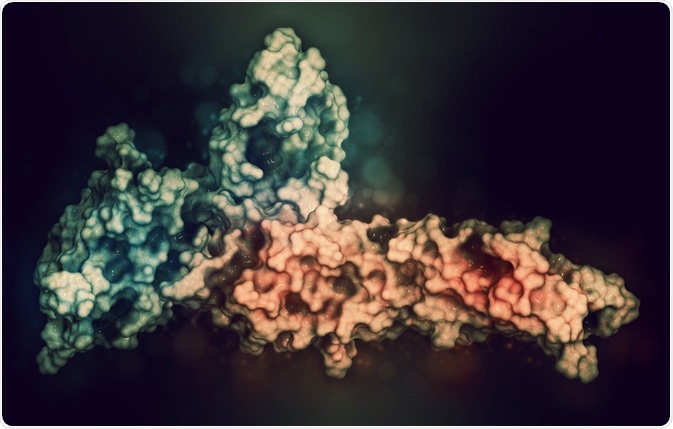Immune checkpoint inhibitors have emerged as a revolutionary type of cancer immunotherapy that function by preventing immune checkpoints, which are a type of protein present on the surface of immune cells, from allowing cancer cells to grow uncontrollably.
 Image Credits: StudioMolekuul / Shutterstock.com
Image Credits: StudioMolekuul / Shutterstock.com
To date, immune checkpoint inhibitors have been used to successfully treat a wide range of cancers, most notably of which include melanoma and Hodgkin’s lymphoma, as well as breast, liver, stomach, cervical, urothelial and renal cell cancers.
Cancer and the immune system
The genetic instability of cancer cells that allows for their uncontrolled proliferation throughout the body is also responsible for their antigen expression that can be recognized by the immune system. Many of these antigens are overexpressed in cancer cells, which allows immune cells like cytotoxic CD8+ cells to recognize and attack these foreign invaders to ultimately prevent their metastasis.
Although our immune system is built to destroy these types of invading cells, tumor cells are incredibly smart and can adapt a variety of mechanisms to avoid such obliteration. For example, some tumor cells have been found to exhaust T cells, which allows for certain inhibitory receptors like cytotoxic T-lymphocyte-associated proteon-4 (CTLA-4) and programmed cell death protein-1 (PD-1), to be upregulated and ultimately further limit the effectiveness of these essential immune cells.
CTLA-4 and PD-1
The two most extensively studied immune checkpoint inhibitors include CTLA-4 and PD-1. CTLA-4, which is naturally expressed on the surface of activated T-cells and regulatory T (Treg) cells, is responsible for the inactivation of T-cells during the priming phase of immunity.
CTLA-4 functions by outcompeting other stimulatory receptors like CD28 to limit the immune responses against weak self- and tumor antigens. PD-1, on the other hand, plays an important role in inhibitor immune signaling, in which this surface receptor regulates adaptive immune responses.
Bladder cancer
Bladder cancer, which is also commonly referred to as urothelial carcinoma, is the fourth most common cancer found in men and the 12th most common cancer found in women. Once urothelial cancer reaches the metastatic state, the prognosis rate is particularly poor, with a 5-year survival rate of only 4.8%.
Immunotherapies in the form of checkpoint inhibitors have significantly changed the way in which metastatic urothelial carcinoma was previously treated, especially when this therapeutic option is combined with other immune mediators or cytotoxic agents.
Melanoma
As the first type of therapy that has been shown to improve survival rates for patients with advanced melanoma, both CTLA-4 and PD-1 immune checkpoint inhibitors have dramatically changed the lives of many individuals with melanoma. While this may be true, research has found that only a specific population of melanoma patients respond positively to immune therapy by checkpoint inhibitors.
These insights have not only allowed health care providers to identify the subset of patients that will respond well to therapy by these immune checkpoint inhibitors, but also expand the knowledge of immune targets in the hopes that other types of immunotherapies will be developed in the future.
Pancreatic cancer
As of 2016, pancreatic cancer became the 3rd leasing cause of cancer death in the United States, which surpasses that which is attributed to breast cancer. In addition to surgical resection being an option for only approximately 20% of pancreatic cancer patients, alternative treatment options like chemotherapy and/or radiation treatment are also limited in their ability to treat this aggressive disease.
In an effort to expand the therapeutic options that are available to pancreatic cancer patients, several studies have investigated the potential of certain checkpoint inhibitors against this type of cancer.
Although the use of checkpoint inhibitors as a monotherapy against pancreatic cancer has not been entirely positive, the combination of this immunotherapy with standard pancreatic cancer treatment modalities has been promising, particularly as compared to when these traditional treatment options are used alone.
Sources
- “Immune Checkpoint Inhibitors Are Boosting the Cancer Battle” – Drugs.com
- Rausch, M. P., & Hastings, K. T. (2017). Chapter 9 Immune Checkpoint Inhibitors in the Treatment of Melanoma: From Basic Science to Clinical Application. Cutaneous Melanoma: Etiology and Therapy. DOI: 10.15586/codon.cutaneousmelanoma.2017.ch9.
- Seidel, J. A., Otsuka, A., & Kabashima, K. (2018). Anti-PD-1 and Anti-CTLA-4 Therapies in Cancer: Mechanisms of Action, Efficacy and Limitations. Frontiers in Oncology 8(86). DOI: 10.3389/fonc.2018.00086.
- Henriksen, A., Dyhl-Polk, A., Chen, I., & Nielsen, D. (2019). Checkpoint inhibitors in pancreatic cancer. Cancer Treatment Reviews 78; 17-30. DOI: 10.1016/j.ctrv.2019.06.005.
- Alhalabi, O., & Shah, A. Y. (2019). Current and Future Landscape of Immune Checkpoint Inhibitors in Urothelial Cancer. Oncology (Williston Park) 33(1); 11-18. DOI:
Further Reading
Last Updated: Mar 11, 2020